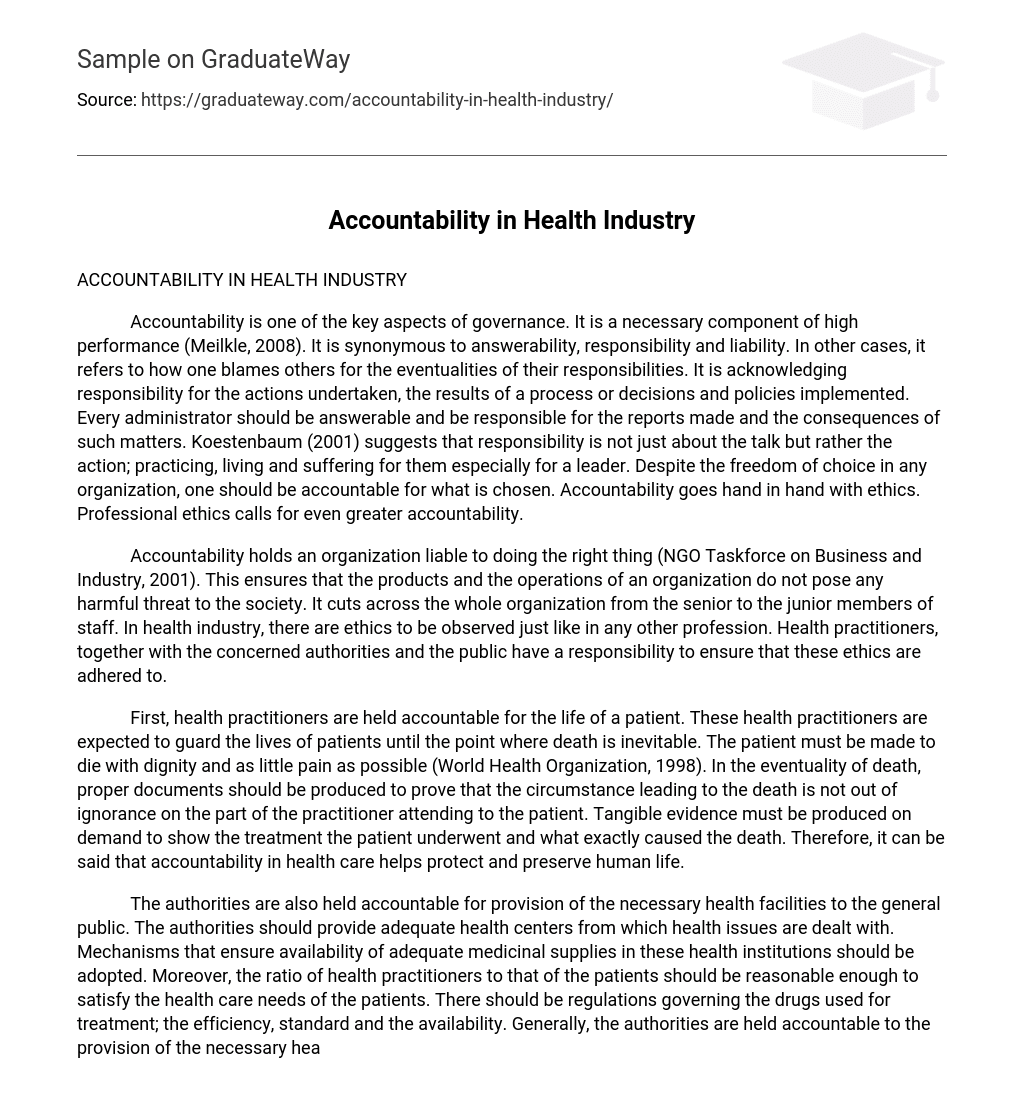Accountability is one of the key aspects of governance. It is a necessary component of high performance (Meilkle, 2008). It is synonymous to answerability, responsibility and liability. In other cases, it refers to how one blames others for the eventualities of their responsibilities. It is acknowledging responsibility for the actions undertaken, the results of a process or decisions and policies implemented. Every administrator should be answerable and be responsible for the reports made and the consequences of such matters. Koestenbaum (2001) suggests that responsibility is not just about the talk but rather the action; practicing, living and suffering for them especially for a leader. Despite the freedom of choice in any organization, one should be accountable for what is chosen. Accountability goes hand in hand with ethics. Professional ethics calls for even greater accountability.
Accountability holds an organization liable to doing the right thing (NGO Taskforce on Business and Industry, 2001). This ensures that the products and the operations of an organization do not pose any harmful threat to the society. It cuts across the whole organization from the senior to the junior members of staff. In health industry, there are ethics to be observed just like in any other profession. Health practitioners, together with the concerned authorities and the public have a responsibility to ensure that these ethics are adhered to.
First, health practitioners are held accountable for the life of a patient. These health practitioners are expected to guard the lives of patients until the point where death is inevitable. The patient must be made to die with dignity and as little pain as possible (World Health Organization, 1998). In the eventuality of death, proper documents should be produced to prove that the circumstance leading to the death is not out of ignorance on the part of the practitioner attending to the patient. Tangible evidence must be produced on demand to show the treatment the patient underwent and what exactly caused the death. Therefore, it can be said that accountability in health care helps protect and preserve human life.
The authorities are also held accountable for provision of the necessary health facilities to the general public. The authorities should provide adequate health centers from which health issues are dealt with. Mechanisms that ensure availability of adequate medicinal supplies in these health institutions should be adopted. Moreover, the ratio of health practitioners to that of the patients should be reasonable enough to satisfy the health care needs of the patients. There should be regulations governing the drugs used for treatment; the efficiency, standard and the availability. Generally, the authorities are held accountable to the provision of the necessary healthcare to its citizens.
The society is accountable for its own health. In case of sickness, patients are expected to seek medical advice. Any disease outbreaks should be reported to the relevant authorities to ensure that proper measures to combat such disasters are taken. It is the responsibility of the patients to make sure that the treatment prescribed by the medical practitioners is adhered to. In case of ineffectiveness of such treatment, advice should be sought on the next step of action from the relevant health practitioners.
Checks and balances in an organization are effected by policies and regulatioins or physical restraints. Most members of an organization develop negative a attitude towards these checks and balances and the enforcers of such measures. The most probable reason for this could be the impractical nature of such restraints. In a successful organization, such measures are the ones developed with consultation from all the members of the organization. It should not be biased or the members feel as if it was imposed on them. They should feel some sense of ownership on these rules. Such measures must be practical and real and should not impact negatively on the personal lives of the employees. The main objective should be to improve the performance of the organization and not to limit the freedom of the employees.
A positive work culture can be created by developing some sense of history. This will assist in giving the members of the organization an identity and a belonging. Stories about the organization and the heroes should be made known. The present issues should be linked to the past. In addition to this, unity is vital for positive work culture. It is the only way to survive from the external threats. Membership should be promoted too. Promotions should be meaningful and lack of promotion not taken in bad taste. There should be some way to make sure that the members of the organization have regular contact and free exchange of ideas. These could include conferences where people meet over a period of time (Gibson, Ivancevich, Donnelly & Konopaske, 2003). Positive work culture makes it easy for workers to accept their respective responsibilities and shun blame games.
Hence, it can be concluded that every member of the community has a role to play in healthcare. Everyone bears accountability to proper health care. It is only wise therefore for everyone to carry out the responsibility assigned without compromising the expected standards or blaming others for the eventualities.
REFERENCE
Gibson, Ivancevich, Donnelly & Konopaske (2003). Organizations: Behavior, Structure and Processes. McGraw Hill.
Koestenbaum, P. (2001). Looking back and Looking to the Future: The Growing Role of Personal Responsibility and Accountability, pp. 9-10.
Meikle, A. (2008). Leadership in Action. CEO Forum Group.
NGO Taskforce on Bussiness and Industry (2001). The Role of Corporate Accountability in Sustainable Development.
World Health Organization (1998). Ethics of Medicine and Health. Alexandria, Egypt.





